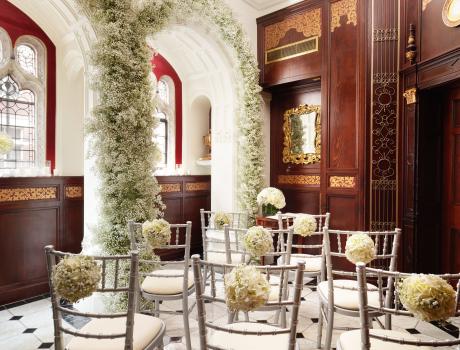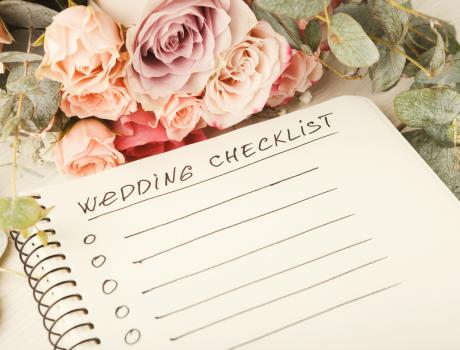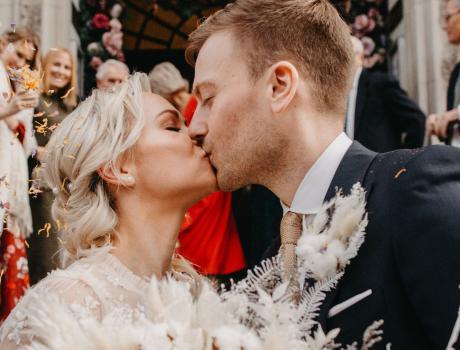
Frequently asked questions about giving notice of intention to marry
Here you will find frequently asked questions about Notices of Intention.
Book an appointment to give notice of intention to marry
Book an appointment to give notice of intention to enter into civil partnership
Should I book a ceremony before giving notice or give notice before booking a ceremony?
We recommend that you book the ceremony first, however, you can still give notice if you have decided on a venue but not confirmed a date for your ceremony.
When you give notice you must state the venue in which your ceremony will take place and this cannot be changed afterwards. If you wish to change the venue or you have stated an incorrect venue, you will have to begin the process again and enter a new notice of intention.
By booking a ceremony before giving notice you have the assurance that you can secure your preferred date and time.
Can I change the venue of my ceremony after giving notice of marriage/civil partnership?
No, the venue stated on your notice cannot be changed. If you change your venue after giving notice you will have to give a fresh notice, this time stating the name of the new venue.
What documents will you accept for proof of address?
- Valid UK photo Driving Licence
- A utility bill dated within the last 3 months
- A bank or building society statement dated within the last month
- Your most recent Council Tax bill dated within the last 12 months
- A mortgage statement dated within the last 12 months
- Current residential tenancy agreement
If you are not able to provide any of the above proofs of address you should contact registrars@rbkc.gov.uk for further details. If you usually reside abroad, please read the "Advice if residing abroad" section of our website.
How soon can I get married or register a civil partnership?
The very earliest that you can be married or have a civil partnership is 29 days after you have both given notice at your local register office. If either of you is subject to immigration control and are therefore referred to the Home Office, they may extend the notice period to 71 days. The Home Office will notify you after your notice appointment if they wish to extend your notice period. In rare instances they may prevent the marriage or civil partnership from proceeding.
Are there any exceptions to the 29-day/71-day legal waiting period?
The only exception to these statutory waiting periods is where one party is seriously ill, not expected to recover, and is unable to be moved to a place licensed for marriages or civil partnerships. In these circumstances you should contact this Register Office for further details, as it may be possible to waive the waiting period upon confirmation from your doctor that you will not survive the usual 29 or 71 day waiting period.
What happens if some of my details change after I have given notice?
Changes to your details can be made in your pre-ceremony interview, immediately before your marriage or civil partnership ceremony. This means that your marriage or civil partnership certificate will have the correct details on there. You don't need to bring evidence of the changes to your ceremony, unless you change your name between giving notice and the ceremony itself.
I am a British citizen, resident in Kensington and Chelsea, getting married abroad. Is there any documentation you can issue to me to present to a foreign authority?
- If you are a British citizen and you are getting married abroad then you may sometimes be asked to provide a ‘Certificate of No Impediment’. The certificate is available 29 days after notice is given.
We are not able to issue this certificate for all countries. Before you contact us, you must check the GOV.UK website for eligibility.
These documents may only be issued to British citizens. If you are a foreign national living in England and Wales and need proof of freedom to marry, you must contact the General Register Office by calling 0300 123 1837 to instead request a Certificate of No Trace of Marriage.
You should also check with the foreign authorities as to how long they regard these documents to be valid for.
I am a non-UK National, resident in Kensington and Chelsea getting married abroad. Is there any documentation you can issue to me to present to a foreign authority?
We may only issue these documents for British citizens. If you are a foreign national living in England and Wales and need proof of freedom to marry, you can contact the General Register Office by calling 0300 123 1837 to request a ‘Certificate of No Trace of Marriage / Civil Partnership’.
I live abroad and will be establishing residency in this country prior to getting married. Do I need to bring any documents from my country of domicile to present to the Registrars in this country?
If you are planning a ceremony at a venue in England and Wales you will be required to do all of your legal paperwork in this country regardless of your nationality or country of domicile.
The only documents you will need to provide from another country will be your passport and, if relevant, your divorce / dissolution documents or death certificate of a previous spouse including third party translation into English.
Please ensure that you carefully read the Advice if Residing Abroad section.
If I get married abroad, do I need to register this marriage in the UK?
No, if you have married abroad there is no facility in UK law to register your marriage in the United Kingdom. You should ensure that you have adequate copies of your official marriage certificate from abroad including official third party translation into English, should you ever be asked to prove that you are married.
Will my marriage abroad be recognised in the UK?
If your marriage was regarded as being legal in the country in which it took place, it will be recognised as a legal marriage in the UK. There are some exceptions where marriages valid abroad are not legally recognised in the UK such as child marriages or polygamous marriages. We recommend that you purchase multiple copies of your foreign marriage certificate (including third party translation into English) and keep them somewhere safe, as it can sometimes be difficult to obtain copies in the future.
What do EEA/Swiss citizens marrying or forming a civil partnership in England or Wales need to know?
- EEA / Swiss citizens who have settled or pre-settled status are relevant nationals and are treated the same as British citizens. If you are British, or an EEA / Swiss national with settled or pre-settled status, marrying or forming a civil partnership with someone who is an EEA / Swiss citizen with settled or pre-settled status, then you must each give notice (separately if required) at the register office in which you reside. Notice must be given no later than 29 days before your marriage.
- EEA / Swiss citizens who do not have settled or pre-settled status should obtain the relevant visa and would be in scope of the Home Office's referral scheme. They will be required to give notice together with their partner at a designated register office in the district where one or both of the parties reside. They may be subject to an extended notice period of 71 days if the Home Office decides to investigate.
- A person with settled or pre-settled status is required to share their status through the online EUSS status checker tool. You must request a six-digit code before your appointment from the view and prove your immigration status GOV.UK page. This code will expire after 1 month.
What do non-EEA citizens marrying or forming a civil partnership in England or Wales need to know?
- If you are a non-EEA citizen and you hold settled or pre-settled status and you are marrying or forming a civil partnership with a British or EEA / Swiss citizen with settled or pre-settled status, then you must give notice at the register office in which you reside. Notice must be given no later than 29 days before your marriage.
- If you are a non-EEA citizen and you hold settled or pre-settled status and you are marrying or forming a civil partnership with either an EEA / Swiss citizen without settled or pre-settled status, or a non-EEA citizen, that person is subject to immigration control, would require the relevant visa for marriage and you would be in scope of the Home Office referral scheme. You would be required to give notice together at a designated register office in the district where one or both parties reside. You may be subject to an extended notice period of 71 days if the Home Office wishes to investigate your relationship.
- A person with settled or pre-settled status is required to share their status through the online EUSS status checker tool. You must request a six-digit code before your appointment from the view and prove your immigration status GOV.UK page. This code will expire after 1 month.
What is the Home Office referral scheme?
- Registration officials will be required to refer all marriage and civil partnership notices to the Home Office if one or both of the parties are EEA / Swiss nationals without settled or pre-settled status, or non-EEA nationals who do not provide specified evidence that they have (a) settled status in the UK (Indefinite Leave to Enter or Remain), (b) an EU law right of permanent residence in the UK, (c) a marriage or civil partnership visa, or (d) exemption from immigration control (e.g. with the right of abode in the UK). The Home Office will investigate your relationship.
- The Home Office may decide to extend the 29 day notice period to 71 days before authorities to marry or form a civil partnership can be issued to give them sufficient time to investigate, or may present the union where a sham marriage or civil partnership is suspected.
- If you are subject to the referral scheme, there will be an additional Home Office statutory referral fee of £30 on top of the £42 fee for each person to give their notice.




